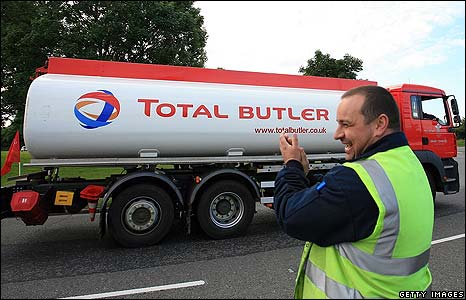
With oil tanker strikes looming on the horizon which could have a detrimental impact on the UK, we take a look at what it means to the UK and a potential longer term preventative cure….
Earlier this month (March 2012), the UK’s largest trade union, called Unite, balloted 2,000 tanker drivers in relation to ‘fixing a broken operation of an industry which is fragmented, unstable and too important to the nation to leave to pure market forces’.
The 2,000 balloted members supply 90% of the UK fuel to the nation’s garages via seven haulage companies. Of the 7 haulage companies, 5 voted in favour of the strike, and of those 5 the vote in favour averaged 69%. So what does this mean for the country in the short term and the longer term?
The strike is planned over Easter weekend, to maximise disruption to commuters as they usually try to travel the length and breadth of the country over the extended weekend. The strike action by the tanker drivers will stop any fuel being delivered to petrol forecourts, so drivers will need to either take preventative measures and fill up prior to the Easter break (hoping their travel plans don’t stretch beyond the range of their fuel tanks!!) or look to use other methods of transport to get to their preferred destination.
In the year 2000, a similar incident happened when trucks blocked the tanker drivers leaving the depots to deliver the fuel in a protest over fuel duties. The disruption of the energy sector bought the country to a virtual standstill, with businesses bought to their knees and panic buying seen amongst consumers. Estimates put the financial implication of the week-long disruption at £1bn.
So, can we expect similar disruption this time? Well we hope not and Ed Davey (the Energy Secretary) has asked ACAS to open up negotiations between Unite and the oil companies in an attempt to bring into place some sort of agreement to prevent the strikes actually going ahead. The Government are also putting in place contingency plans such as training the RAF to deliver the fuel to the forecourts, although there is not the capacity to cover the entire fuel distribution network. They have also suggested that the general public and business have contingency plans in operation to allow them to avoid the impacts if the talks fail and strike action does go ahead.
What are the longer term implications for the UK? Well, shortly we are hosting the Olympic Games here, and this would be a disaster if we found ourselves in a similar situation then.
The fuel network operates on a just-in-time basis (i.e. large reserves aren’t kept in forecourts, supply matches demand but on a very short term basis), and I think this vastly increases the impact of such action. However in the UK and everywhere in developed countries we are addicted to petrochemical fuel and we can’t seem to get away from using it.
We need fuel for everything, to do business, to see friends, to go out and buy our food (which requires fuel itself for delivery to supermarkets). This is an internal UK based issue at the moment. But what would happen if oil imports into the UK were restricted or stopped all together? Well the country would face the exact same problems but it would probably be magnified. And this wouldn’t just be the case for the UK, this would affect most countries across the world who are net oil importers (barring the Middle East and Venezuela). Our reliance is like an addiction, and we do not currently have the substitutes in place to go cold turkey.
So how do we go about putting in place this support? It is certainly not going to happen overnight, but on the plus side we have some of the technologies already in play today. We have new fuel systems, hydrogen cells, electric cars (even hybrids make us less reliant) and also biofuels that are already blended with petrol and diesel. These substitutes at the moment are currently expensive and some of the technologies are unproven so we need to make further investments to bring the cost down.
Imagine though having a solar PV charging station for your electric car? You wouldn’t even need to give next’s weeks planned strikes a second thought. We are certainly not there yet, but now is the time to start reducing our reliance on fuels. Companies are recognising this, investing billions of pounds trying to find the best ways to do it, so let’s hope the transformation happens sooner rather than later and then the only thing we need worry about over Easter is the number of chocolate eggs I have in my basket…












No Comments yet! Be the first one.